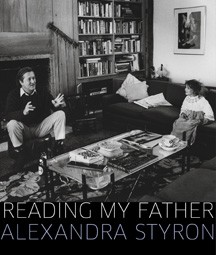A Review: “Reading My Father” by Alexandra Styron
- Share
- Tweet
- Pin
- Share

Reading My Father
By Alexandra Styron
Scribner, 2011
Those of us who enjoy the guilty pleasure of a Mommy Dearest celebrity tell-all story will not be disappointed in Reading My Father, Alexandra Styron’s memoir of growing up with her famous author father William Styron (1925 – 2006).
A grand old man of American letters, Styron is best remembered for his 1967 novel accounting a slave revolt, The Confessions of Nat Turner, and his 1979 story of a Polish-Catholic survivor of Auschwitz, Sophie’s Choice. This latter tale became a blockbuster movie starring Meryl Streep, Kevin Kline, and Peter MacNicol.
Alexandra Styron has followed in her father’s footsteps as a writer, first with her debut novel All the Finest Girls, and now her memoir. And like her father, she draws heavily on autobiographical details in her fiction, her characters sometimes thinly veiled versions of their real-life counterparts. Subsequently her memoir is occasionally brutally candid.
Reading My Father is actually two intertwined stories, one a biography of the famous father and the second, the author’s memory of living with the legend. The book is engaging in both respects.
William Styron rose to such fame (including a Pulitzer Prize) that a list of his friends reads like a Who’s Who: George Plimpton, James Baldwin, Irwin Shaw, James Jones, Norman Mailer, Teddy Kennedy, Leonard Bernstein, Mia Farrow, Mike Nichols, Philip Roth, Arthur Miller and Gabriel Garcia Marquez, among others. But at the same time, this larger-than-life figure is humanized as his daughter recalls his neuroses, his failings, his unfaithfulness and his bouts of depression (which he detailed in his 1990 memoir, Darkness Visible).
But much of the tension in the book is generated through the revelation of the daughter’s relationship with her father. Theirs is a story of disconnects, beginning with her girlhood and her father’s lack of sensitivity to a vulnerable child. The narrator’s bitterness at times led this reader to expect a devastating discloser of physical abuse, but such is not the case. The Styron household was simply one involving too much drinking, too much travel, too much attention to careers – in short an all too often told modern account of a dysfunctional family.
But while the story of the Styrons is sometimes grim and disturbing, the kids are ultimately fine. Susanna Styron is a successful film director; Paolo (Polly) Styron, a renowned modern dancer; and Thomas Styron, a professor of clinical psychiatry at Yale. Their poet mother Rose Burgunder created a satisfying life parallel to that of her husband.
And Alexandra Styron, after a number of false starts in her life, found fulfillment both in her career as a writer and in her personal life with her husband and children.
However, the silver lining of her success continued to be shadowed by her father’s dark side. Any resolution she managed to achieve after her father’s death was still ambivalent.
But those of us who have pulled the curtain on our fathers and discovered the frailty of what we thought was a mighty Wizard of Oz, or who have watched a father’s humanity fade as he slowly disappears in sickness and death, will appreciate the universality of Alexandra Styron’s experience. Hers is a tale of sound and fury well told, one that will at times make the reader uncomfortable, but will at the same time provide vivid glimpses into our humanity:
“The five of us sat on the hospital bed. Mum, by his head, stroking his hair. All of his children forming the rest of the circle. While the fluid in his lungs crested, and his breathing halted for up to a minute, we coached him on toward a death that just couldn’t be forestalled any longer. It’s okay to go, Daddy. It’s okay. There was no minister. So we talked of heaven, and invented our own last rites…Someone began to recite the Twenty-third Psalm, a prayer drummed into us in elementary school but that we now, laughingly struggled to get straight. The Lord is my shepherd; I shall not want. He leadeth me beside the still waters…no…He maketh me to lie down in green pastures… Weeping, Mum asked him to say ‘I love you’ just once more. He couldn’t speak, but briefly and for the last time, he opened his eyes.”
For those of us who have been fans of William Styron’s fiction, Reading My Father adds another dimension to both our understanding and enjoyment of one of America’s finest 20th century novelists.
